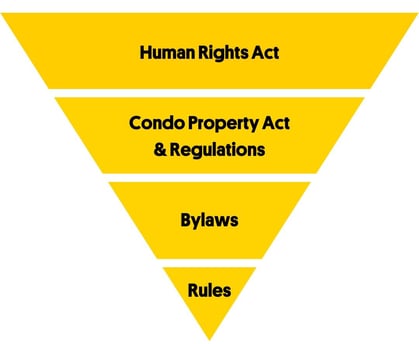.jpg)
Decoding Condo Bylaws in Alberta
Does the idea of regulating the curtain colour, where hockey gear can be hung, or how many St. Bernards can live in a unit cause you to raise an eyebrow? While these examples may seem mundane or unimportant, carefully crafted condominium bylaws play an integral role in harmonious community living.
Simply put, Alberta Condominium bylaws are the rules that govern a Condominium Corporation, its Owners, and its Residents. While many people are familiar with what bylaws restrict (like the pets, appearance, and use of common property previously mentioned), a Condo’s bylaws also address matters like the election of the Board, how condo fees are collected, and the maintenance responsibilities of the Corporation and Owners.
Know someone who could benefit from this article? Share it now!
Table of Contents
The Initial Set of Bylaws
In Alberta, the Condominium Property Act requires that all condominiums have a set of bylaws. As per Section 33 of the Act:
“On the registration of a condominium plan, the bylaws of the corporation are the bylaws set out in the regulations, and those bylaws remain in force in respect of that corporation until they are repealed or replaced by special resolution.”
The initial or default set of bylaws for a Condo Corporation can be found in the Condominium Property Regulations as “Schedule 4”. As the initial bylaws are basic and fairly general, they are often amended, repealed or replaced.
.png?width=97&height=97&name=Lightbulb_RGB_Digital%20(2).png) Tip: Need to view your condo bylaws in Alberta? You can obtain a copy of your bylaws through the Alberta Land Titles office (subject to a fee). Tribe clients can view and download their bylaws for free 24/7 through the Tribe Home Community Platform.
Tip: Need to view your condo bylaws in Alberta? You can obtain a copy of your bylaws through the Alberta Land Titles office (subject to a fee). Tribe clients can view and download their bylaws for free 24/7 through the Tribe Home Community Platform.
Amending Condo Bylaws
Though parts of the bylaw amendment process can be a bit grueling, Condo Corporations often opt to change or replace their Initial Bylaws to ensure they are relevant to the community. There are three types of revisions that can be done to a set of bylaws:
- Amendment/ Replacement of a Current Bylaw – This can be done to better align a Bylaw with the Act & Regulations or to add more detail to a bylaw. An example of this would be the amendment of a condo pet bylaw to include limits to size or type and outline an approval process.
- Creation of a New Bylaw – Often this is done to add a bylaw specific to an individual community such as regulating the use of an amenity (i.e. pool, gym, dog wash).
- Deletion of a Bylaw – A bylaw may be removed if it is no longer relevant to a community or conflicts with the Act or Regulations. For example, a bylaw restricting a community to adult only (18+) can be removed to align with the Human Rights Act.
Condominium Bylaws in Alberta can only be amended, created, or replaced by special resolution. A special resolution requires obtaining the approval of at least 75% of all Owners eligible to vote and whose collective votes represent at least 7,500 unit factors.
.png?width=94&height=94&name=Lightbulb_RGB_Digital%20(2).png) Tip: Gathering sufficient approvals for a resolution is a part of the process often likened to cat herding. A Condo Board’s catnip or solution is to actively engage their community. This could include informal town halls, door-knocking, and setting up a table with information in a common area like a lobby.
Tip: Gathering sufficient approvals for a resolution is a part of the process often likened to cat herding. A Condo Board’s catnip or solution is to actively engage their community. This could include informal town halls, door-knocking, and setting up a table with information in a common area like a lobby.
Once a special resolution has passed, the changes must be registered with Land Titles using the aptly named Form 3 – Notice of Change of Bylaws. Once filed, the bylaw changes do not come into effect and cannot be enforced until they appear on the condominium additional plan sheet.
Changing condominium bylaws is a significant undertaking. We advise any Condo Board contemplating bylaw changes to seek legal counsel.
Enforcing Condo Bylaws
"My neighbor banged on the wall at 3.30 am. Luckily, I was still up playing music. He shouted, 'Can we have a little respect please?' So, I shouted back, 'I'm not a big Aretha Franklin fan, but okay, this one is for you.”
While the above scenario is entirely made up, it’s not hard to imagine it playing out in a Condominium. Your Condominium Board is responsible for upholding the Condo Corporation’s bylaws in a fair, consistent and timely manner.
Maintaining bylaw compliance requires a nuanced approach. Remember, those who may contravene Condo Bylaws aren't faceless entities; they're neighbours, people within your community that you likely interact with regularly.
The Condo Board must take the following steps to enforce a bylaw:
- First, the Condo Corporation must receive a complaint from an Owner or Resident.
- Then the Condo Board must provide written notice of the alleged violation to the unit Owner (and tenant if applicable) thought to have made the violation which includes a deadline to address the matter.
- Next, the unit Owner must be given at least 3 days (excluding holidays & Sundays) to correct the violation or provide a written response.
- Lastly, if the violation is not resolved within the required time frame, the Board may pass an ordinary resolution to sanction the Owner.
The Board may resolve to impose a penalty, such as restricting amenity usage or imposing a monetary sanction. For either choice, the Owner must receive a notice with the resolution date and the reason for the penalty.
The Condominium Property Regulations set the maximum amount per sanction which is $500 for a first-time offence and $1,000 for second and subsequent instances though a Condo’s bylaws may set out a lower amount.
Remember, most Board’s would prefer to focus their valuable time and energy on their other responsibilities beyond bylaw enforcement. Simple steps such as ensuring Owners have easy access to the Bylaws or communicating seasonal bylaw reminders can go a long way in preventing violations.
Psst... Our in-house platform, Tribe Home, includes a notice feature called The Loop. This easy-to-use feature enables our Community Managers and Condo Board to send reminders to Owners & Residents with just a few clicks.
The Difference Between a Condo Rule and a Condo Bylaw
Although the terms 'Bylaws' and 'Rules' are often used interchangeably, it's important to note the distinct differences between them. Rules (sometimes called policies) often add to or expand on a Corporation’s bylaws.
Rules differ from a condo’s bylaws in the following ways:
- Condo Boards can make, amend, or repeal rules by ordinary resolution.
- Rules cannot restrict the use of a condo unit.
- Condo Corporations cannot levy sanctions for breaches of a rule.
- Owners and community Residents must receive at least 30 days written notice of a new rule. The rule has no effect until after the 30 days' notice.
- Should a conflict arise between a condo rule and a condo bylaw in Alberta, the bylaws prevail.
Hierarchy of Legal Framework in
Alberta Condos

Navigating Condominium Bylaws
Whether you’re a volunteer on the Condo Board or an Owner hoping to adopt a furry friend, navigating condominium’s bylaws can feel difficult. However, Condo Bylaws are fundamental to fostering a cohesive community. They provide the guiding framework for the Condo Board and align expectations among all Owners and Residents.
Licensed Condominium Managers, like our team here at Tribe, can assist Condo Boards in understanding their condo’s bylaws while also breaking down the relationship of those same bylaws with the rules, Acts, and Regulations that govern their community.
[BONUS] Are all Condo Bylaws enforceable?
This is a common question in the Alberta condominium community and the short answer is no. Bylaws that contravene the Condominium Act, the Human Rights Act, or other legislation are unenforceable.
For example, if a condominium was registered after January 1st, 2018, has an age restriction bylaw (such as 25+), that bylaw would be unenforceable as it violates the Human Rights Act of Alberta.
Found this guide helpful? Share with your community!



